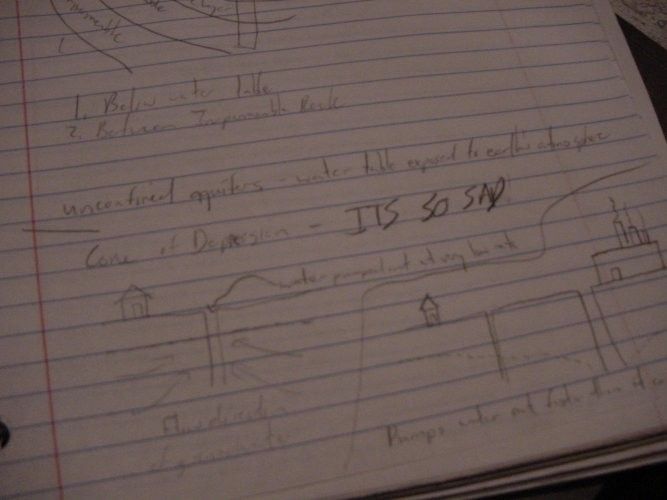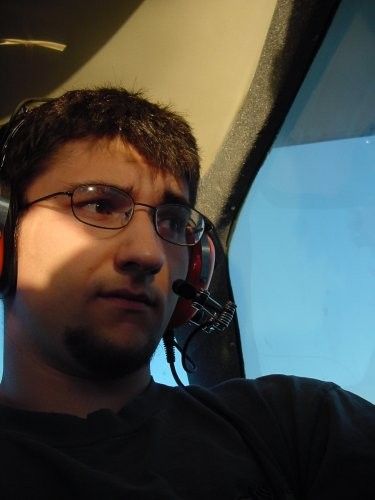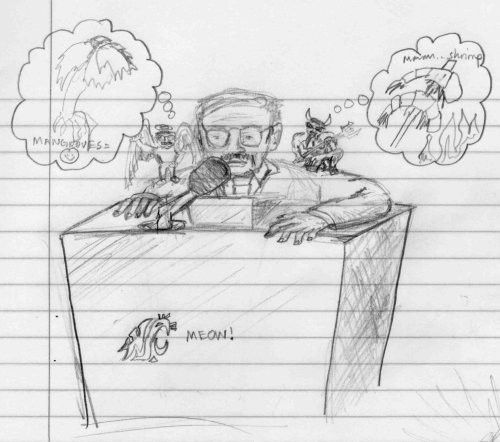Explicit Deconstructor
"The cue never came, the lights never went out."There are times...sometimes I feel like...I feel destructive. I want to take all I've done and throw it away. My great accomplishments, my finished products, my everything that I can feel proud of. I want them never to have happened. I want...I think it is because I want them to happen again.
At times I want to break idkfa. Ruin it, more like. Permanently delete its files, its database entries, the backups, the copies at home. Have it return nothing but a white page and a 'file not found' error. Or maybe a short, vague message. A poem, even. Nothing that reflects what it had become, nothing to show what it was. Like, I guess, it never happened.
Then I could start over. Build it again. Have people sign up, choose their names, their colors, their quotes. Have it be new all over again. Something young, naive, something novel.
So easily I could rebuild it. Every problem I've already solved, every function implemented. Maybe go back and do things right, add the things I've always wanted. Every web page. Every script. Every program. Every data insertion, deletion, update. Every thing I've learned along the way. Every test I've taken, every book I've read, every word I've written. But not necessarily because I can make them better. Make them right. But to break them just for the sake of making them again.
How easy it is with my creations, my toys. To start over and anew, with small consequence. But what is truly strange is that no matter how many times you fix it, it does not seem to solve the problem. I am not my own architect. Designer. I cannot fix myself, for I do not understand how I am made.
$str = "walks we paths yet walked upon, ";
My name is Joshua Rhoades. I have 5 email addresses. I have two idkfa accounts. I have nine passwords. I have a social security number. I have a birth date the same as Harry Potter's. None of these things makes me unique. None of things give me an identity.
In database terms, 'identity' is a single object or a collection of objects that can be uniquely attributed to a record, that is to say, different from everything else. A record can be any piece of data, or a group of data. But a record does not necessarily have to be unique.
Keeping records of people is always a challenge when it comes to creating a data model. People can (and often are) named the same thing. They choose the same passwords, the same email addresses, the same relevant characteristics to the system into which they are entered. If a data contraint is that each record must be unique, then there are only two solutions available for dealing with people.
The first is to randomly or algorithmically assign a unique identifier upon time of record creation. While it is meaningless outside of the system, it serves its purpose well inside of it. This is like how you are assigned your social security number at birth.
The second solution is to force the record (the person) to uniquely identify themselves at time of record creation. The system will either require the input of a valid unique identifier from another system, or will require the user to come up with a random identifier for themselves. This is like how you sign up for an account with a service, where you are asked to create a unique user name. Or, for more official systems, you are asked to enter your social security number.
Your entire life you have been treated as such. Behind your 'identity' are imaginably thousands of records linking back to you. Your credit card transactions, your license plates, your parking permits, your school enrollment, your gym membership, your network adapter's DHCP lease. All linked back to some unique identifier on some computer system quietly humming in an air conditioned room.
I am user 118, otherwise known as 'kaiden' on idkfa. I am my laptop purchase, linked to my laptop's serial number and my credit card number, linked to the NIC adapter which has a unique 12-digit hexadecimal number burned into it. I am my cell phone number. I am my mother's maiden name. My fingerprint. The veins in my eye.
These are things that I have. Records associated with my self. But they are not necessarily me. Just how to reference me in terms of something else.
So then what is my identity? I guess whatever I identified myself as at the time of record creation.
$str .= "yet why walks they back grinning, ";
There is a concept in operating systems design called 'context switching.' It is how your computer appears to do many things at once.
Every program on your computer is a 'process', or a 'task'. It is a single line of execution loaded into memory with a single well defined entry point, and a hopefully eventual end point.
Each of these processes runs in a 'context.' This means that for any process there is collection of registers, a section of memory, and a certain time span given to it to perform machine operations.
Your personal computer can run hundreds of processes. Larger computers can run thousands.
This does not mean, however, that the 'context' of each of these programs is unique. There are only 13 registers in the x86 architecture, certainly not enough to go around.
Context switching is how your operating system tricks all of your processes into thinking they are the only program running. Ever 16 nanoseconds your OS interrupts whatever it is doing. It saves all of the registers into memory, saves the location of the instruction it was about to perform, and it 'switches' over to another process that was previously saved. That process's register contents are retrieved from memory, its memory pointers restored, and its next instruction is executed like nothing ever happened.
If you do this fast enough, it gives the appearance of doing many things at once, when really it is just switching between tasks extremely fast.
The program itself is not aware of this at all. The program is only really the next instruction to the executed. Unless the operating system somehow tells it, it does not know when it is to stop or start. It does not know how the operating system keeps track of it. It doesn't even know that it is running concurrently with dozens of other processes. It has no identity.
What if the program's goal was to determine its identity? To understand itself? This, I think, is impossible. Let us say that in order to 'understand' itself it only needs to have a copy of itself in memory (not the case). After the program had calculated its bounds in memory, and copied its contents into itself, then it would have defeated its own purpose, as it would then be twice as big, and would have only 'understood' half of itself. It would be circular, an endless problem. Like a snake eating itself, but backwards.
So I have to ask: Are we like this, oblivious of our true states? Our brains are the most powerful computational machines we know of. It is entirely plausible that they can operate unbelievably fast. Is it possible that they can operate fast enough to be doing many other things other than processing our consciousness? Is it possible our brains are in control of any number of contexts, running hundreds, possibly thousands of processes, each oblivious to the other?
I answer yes.
I believe consciousness is merely a subprocess of a larger computational entity. Our thread of thought can be started and stopped, 'put to sleep', blacked out, put into a coma, and eventually restored. All without conscious control. We are noticeably affected by our emotions, pain, fear, love, things we don't truly understand but instead 'feel,' conditions within ourselves that may not necessarily have a cause, but most definitely have an effect on how we operate.
Oh, hell, why stop there? We can be killed and brought back to life. We can be deleted. Copied. Corrupted. Interrupted. And rewritten. At the mercy of whatever is running us.
I don't have to prove it. Yet. I just want to believe it.
$str .= "walked we seems so very long, "
Why would I believe such things? That we have no identity but that which is assigned to us. And even if we were unique, we could not understand why, for we are only a small portion of our brains, and under such conditions knowing oneself would be impossible. Instead, we must be told what we are, reflected back in distorted form.
So dull. Dark. Dreary. Defeating. Unromantic and unkind. You could see it like that.
When I started writing this I felt absolutely terrible. I had Dreamweaver open and ready to take it down. I wanted people to wonder at its disappearance, fear that something truly bad was happening. I wanted to kill it all and then bring it back to life. Exercise my power. Flip the nasty looking switch.
A downfall of my different perspective: the need to exert upon something I have control over. An inherit problem in thinking that you are less than you truly are. Of reducing yourself to machinations and algorithms. It gives me no comfort, no assurance in my life that all will be ok. My philosophy doesn't support magic or miracle. I don't know what I am and chances are never completely will.
But that makes me all the more surprised at the truth when it does happen to come along. And it will be my truth. And that I believe is worth much more.
So break me. For I am flawed if I am truly the things I say. Tear me apart and fix me. Show me what is wrong.
$str .= "must they seem a beginning."
exit($str);
- Previous: Coterminous
- Next: I Don't Wanna Be a Jedi







